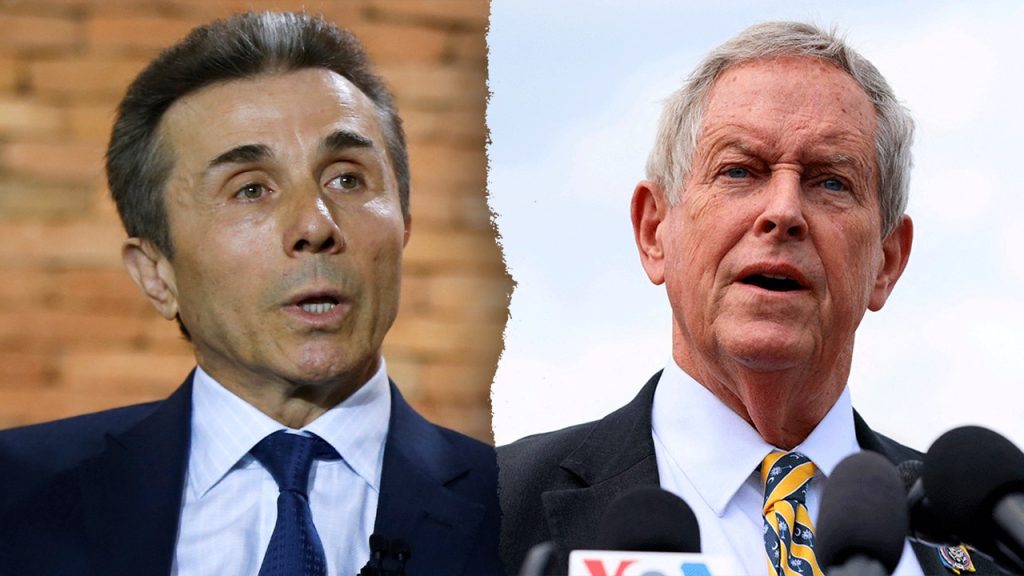Congressman Joe Wilson’s appeal to the incoming Trump administration underscores a growing concern within the US government regarding the erosion of democratic principles in Georgia and its increasing alignment with Russia, China, and Iran. Wilson urges the administration to prioritize leveraging US law enforcement mechanisms to expose and dismantle illicit financial activities linked to the Georgian Dream party and its de facto leader, Bidzina Ivanishvili. These activities, including sanctions evasion schemes and scam call centers, are alleged to be funding the regime and supporting its drift away from Western alliances. The letter emphasizes the importance of holding Ivanishvili accountable for undermining Georgia’s democratic future and benefiting from Russia’s aggression in Ukraine, which is further facilitated by Chinese, North Korean, and Iranian complicity. The congressman’s plea reflects a broader effort to protect US interests and counter malign influences on the global stage.
The timing of this appeal is significant, coming after the US Treasury Department imposed sanctions on Ivanishvili for undermining Georgia’s democratic trajectory. Wilson commends this action as a “significant step forward” and encourages the administration to extend sanctions to Ivanishvili’s family members and close associates. He argues that disrupting the financial networks supporting Ivanishvili’s regime would be a crucial blow to the network of authoritarian states and would pave the way for Georgia’s return to democratic governance. This action is presented as an opportunity to advance shared US goals of defending democracy and countering malign influence worldwide.
The congressman’s concerns are rooted in a series of troubling developments in Georgia, including the Georgian Dream party’s disputed victory in the October parliamentary elections and the subsequent decision to suspend the country’s accession to the European Union. These actions triggered widespread protests and condemnation from international observers who concluded that the elections were fundamentally flawed. Despite calls for new elections, the Georgian parliament proceeded to inaugurate a hard-line West critic as president, an event notably lacking in foreign dignitaries. The Georgian Dream government’s downplaying of US sanctions and expressed optimism about a more favorable relationship with the Trump administration is viewed with skepticism by some foreign policy experts.
The prevailing view among analysts is that the Trump administration is unlikely to adopt a softer stance towards Georgia given its increasing alignment with US adversaries. Laura Linderman, a senior fellow at the American Foreign Policy Council, argues that the Georgian Dream’s expectation of better treatment under Trump is misguided. She points to the likely tougher stance of Trump’s national security team against countries aligned with China and Iran. Furthermore, the bipartisan consensus in Congress supporting Georgia’s democratic future would make it politically costly for Trump to deviate from the established course.
Georgia’s recent actions, including formalizing a partnership with China, favoring Chinese investments over American ones, adopting a Russian-style “foreign agent” law, and suspending EU accession talks, paint a picture of a country drifting further away from Western democratic values. This trend is further underscored by Prime Minister Kobakhidze’s multiple visits to Iran this year, including attendance at the inauguration of a president known for anti-American rhetoric. These actions signal a growing affinity for authoritarian regimes, raising concerns among US policymakers about the country’s strategic direction.
James Carafano, a senior counselor at the Heritage Foundation, emphasizes the shift in the geopolitical landscape and warns that countries relying on support from Moscow and Beijing can no longer expect a favorable or indifferent response from the United States. He asserts that the Trump administration will likely adopt a more assertive approach towards such regimes, particularly when US interests are at stake. Carafano’s perspective highlights the growing tensions between democratic and authoritarian powers and suggests a less tolerant environment for countries perceived as aligning with US adversaries. This firm stance against authoritarian influence is expected to be a hallmark of the Trump administration’s foreign policy approach.

